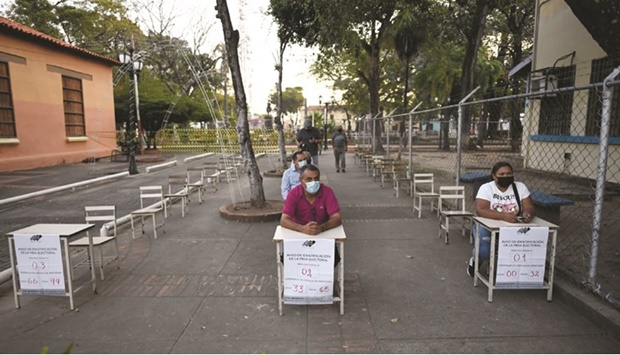Thousands of police and soldiers kept a watchful eye yesterday on elections in a fiefdom of late Venezuelan president Hugo Chavez that were interrupted mid-count last year on the brink of an opposition victory.
The rerun gubernatorial election in western Barinas state, where Chavez’s father and brothers have held political power since 1998, was held among widespread claims of ruling party interference.
It came after a regional election on November 21 that appeared to be going the way of opposition figure Freddy Superlano.
The ballot count was stopped by a court as Superlano claimed what would have been the first defeat in Barinas in 23 years for the United Socialist Party of Venezuela (PSUV), now headed by President Nicolas Maduro.
A week later, Venezuela’s Supreme Court – accused of pro-government bias by the opposition and observers – annulled the preliminary result, which showed Superlano leading.
It granted a request by the country’s public finances watchdog to declare Superlano “ineligible” due to “administrative and criminal investigations” into accusations of corruption, and ordered new elections to be held without him.
Superlano is an ally of opposition leader Juan Guaido.
Guaido is recognised by the United States and dozens of other governments as Venezuela’s true president over Maduro, whose 2018 re-election was rejected as illegitimate by part of the international community.
With Superlano out of the running and other would-be challengers disbarred, the Popular Will opposition party put forward Sergio Garrido, an unknown regional lawmaker for yesterday’s rerun in Barinas.
In what many consider to be a stacked race, Garrido is facing off against Jorge Arreaza, a former vice-president and foreign minister and father to Hugo Chavez’s eldest grandson.
After casting his vote, Arreaza told journalists that if he wins, he will hold talks with all sectors of Barinas, including the opposition, and would restart the local refinery, among other measures.
Garrido, expressing confidence in his victory said: “The people of Barinas are coming out to vote and tonight there will be parties and joy.”
Socialist party vice-president Diosdado Cabello and two of Chavez’s three daughters have accompanied Arreaza, while Garrido was joined by leaders from the four main opposition parties.
The PSUV and Maduro’s government are leaving little to chance this time.
Officials delivered social housing and unveiled numerous public works projects during the gubernatorial campaign.
Roberto Picon, a member of Venezuela’s National Electoral Council (CNE), which is dominated by PSUV backers, is among those to have denounced abuses by officialdom.
“The monitoring and criminalisation mechanisms available to the CNE are insufficient to control a concerted action of the State in the electoral campaign such as demonstrated in Barinas,” Picon said on Twitter.
Maduro’s party won 19 gubernatorial races in the November 21 vote.
Barinas was alone among Venezuela’s 23 states not to have the election outcome confirmed by the CNE.
EU observers said that the vote countrywide was marred by irregularities, including the widespread use of state resources by the PSUV, and “arbitrary disqualifications” of opposition challengers.
“The opposition won and they (the ruling party) didn’t like it, because they wish to continue with their hegemony and dynasty,” said Nelson Leon, a 68-year-old music teacher who voted near Plaza Bolivar in the state capital, Barinas, yesterday.
Chavez’s father, Hugo de los Reyes Chavez, was governor of Barinas from 1998 to 2008.
He was followed by Hugo Chavez’s brother Adan – a former Venezuelan ambassador to Cuba – and then older brother Argenis from 2017.
Hugo Chavez remains popular in Barinas – beloved by many for redistributing the country’s vast oil wealth to the poor, but also blamed for the country’s now miserable economy and sky-high crime rate.
Venezuela is battered by recession and hyperinflation, and three in four of its citizens live in extreme poverty, according to a recent study.
Millions have left the country in recent years to try their luck elsewhere.
More than 600,000 of Barinas’s 870,000 inhabitants were eligible to cast ballots at 543 polling stations open for 12 hours from 6am yesterday.
Some 15,000 soldiers and 10,000 other security personnel were deployed to voting sites.
Whatever the result, it will not alter the Socialist party’s control of the majority of governorships, but could offer a symbolic victory for the fractured opposition.

People sit on chairs as they wait for their turn to vote outside a polling station in Barinas.
